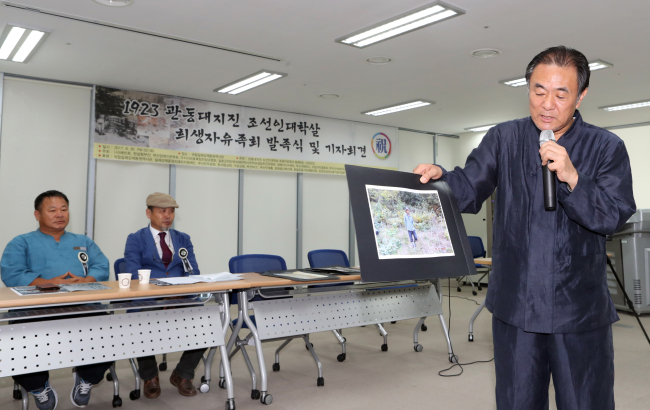The bereaved families of Koreans killed in a post-earthquake massacre in Japan nearly 100 years ago banded together Wednesday to reveal the truth and demand Tokyo's compensation.
In the aftermath of the 1923 Great Kanto Earthquake, up to 6,000 Koreans were killed by Japanese people agitated after the government spread a rumor that Koreans planned a riot, according to historians.
Seven victims' families launched the first association devoted to the incident which has not received much attention, even in Korea, compared to other atrocities by imperial Japan.
 |
(Yonhap) |
"It is deplorable that after this long time passed, the Korean government cannot even announce the identity of any single family of the victims," Oh Choong-kong, a Korean-Japanese producer of a documentary film about the tragedy, said during the ceremony at the state-run National Memorial Museum of Forced Mobilization under Japanese Occupation in the southeastern city of Busan.
He lamented that there is no government body to investigate the incident. In 2014, 103 South Korean lawmakers proposed a bill to establish a committee to investigate the incident, but it was not passed.
The bereaved families will campaign to urge the two governments to investigate the incident and find out who the victims were. They are also demanding that Japan send the remains of the victims home and compensate their families for their deaths.
The organizers held a memorial service to pay tribute to the victims at a former port in the city where they left for Japan after Korea fell under Japan's colonial rule in 1910.
On Sept. 1, 1923, the magnitude 7.9 earthquake flattened Tokyo, Yokohama and surrounding prefectures, leaving some 400,000 dead or missing. A spree of killings erupted when the Japanese government spread a rumor about a planned riot by Koreans in order to calm public anger.
"With the formation of the association, we will make efforts to have South Korea and Japan jointly bring light to the incident," Sumiko Yamamoto, who heads an executive committee to pay tribute to the massacre's victims in Japan's Kanagawa Prefecture, said during the ceremony. (Yonhap)








